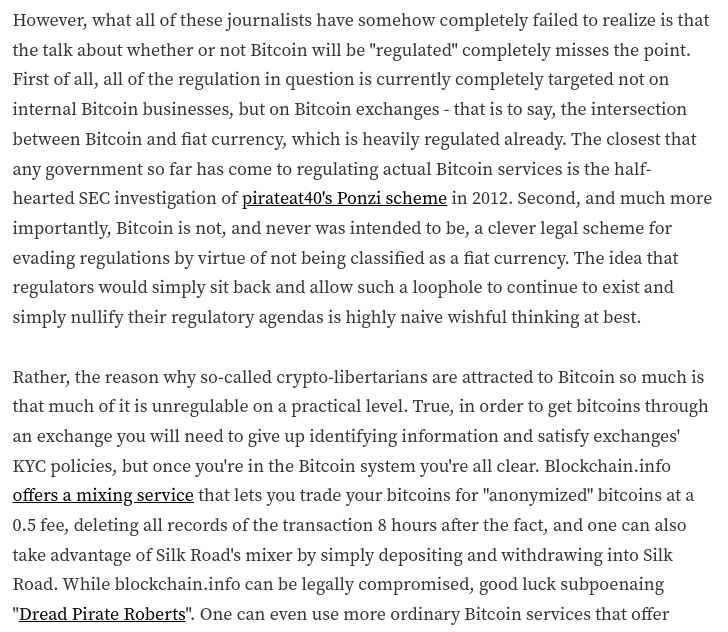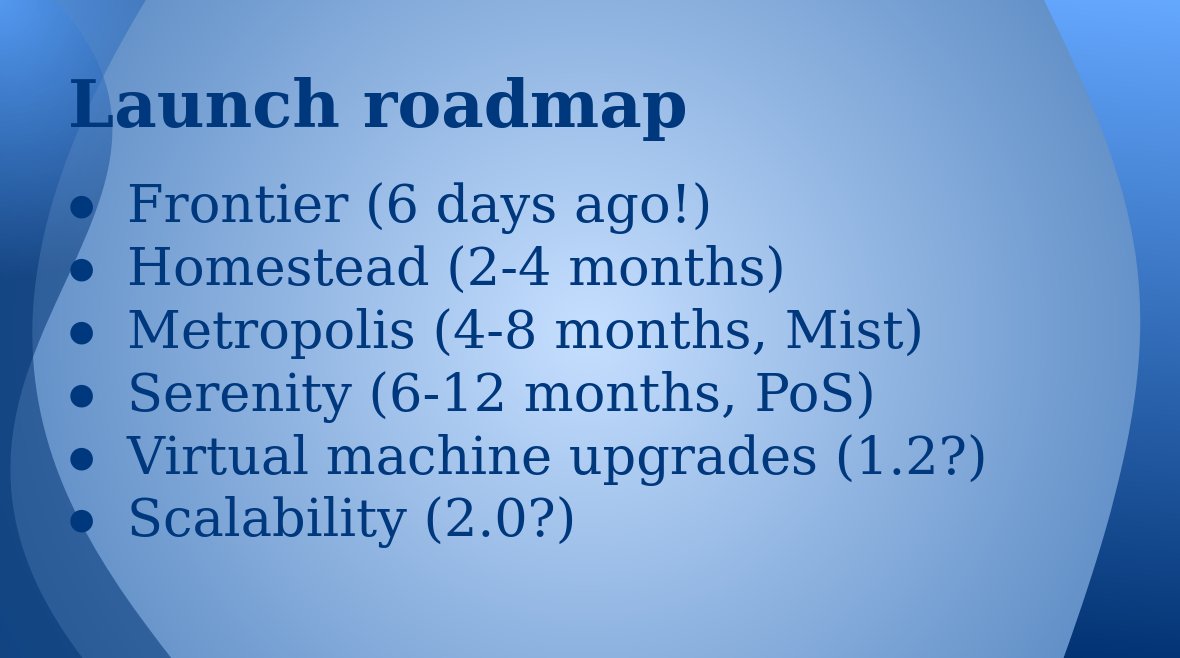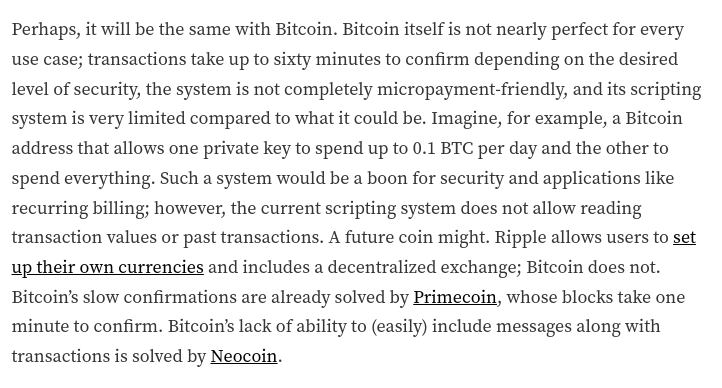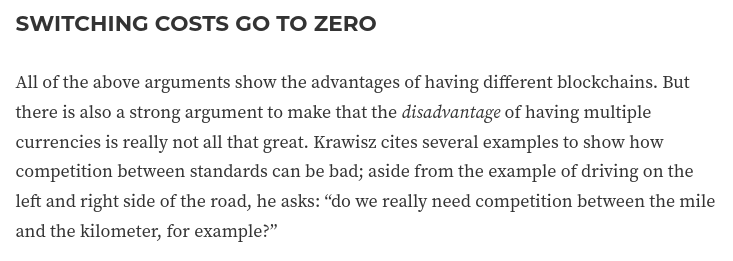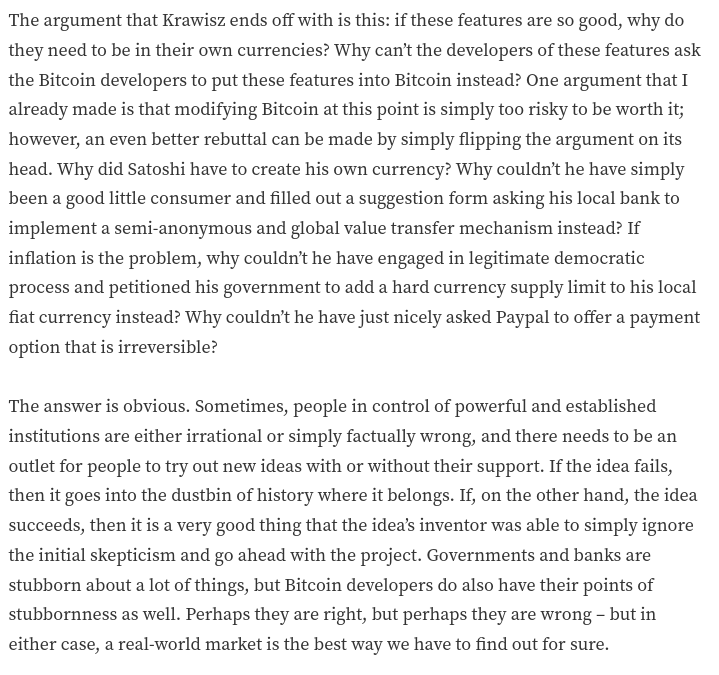Thread
Happy new year!
Today, a mini-tweetstorm of some of the things I've said and written over the past decade, and what I think about those subjects today.
Today, a mini-tweetstorm of some of the things I've said and written over the past decade, and what I think about those subjects today.
1. In 2013, I wrote this piece on "how Bitcoin can actually help Iranians and Argentinians". The core point: Bitcoin's key benefit is internationality and censorship resistance, NOT "the 21m limit". I predicted stablecoins will prosper.
bitcoinmagazine.com/culture/how-bitcoin-can-actually-help-iranians-and-argentinians-1374585681
bitcoinmagazine.com/culture/how-bitcoin-can-actually-help-iranians-and-argentinians-1374585681
Last week, I actually went to Argentina! My verdict: generally correct. Cryptocurrency adoption is high but stablecoin adoption is really high too; lots of businesses operate in USDT. Though of course, if USD itself starts showing more problems this could change.
2. This piece from 2013 on the consequences of Bitcoin services becoming more "regulated":
bitcoinmagazine.com/culture/bitcoin-is-not-losing-its-soul-or-why-the-regulation-hysteria-is-missing-...
Core argument: Bitcoin is resisting the government not by being clever about what *legal category* it's in, but rather by being technologically censorship-proof.
bitcoinmagazine.com/culture/bitcoin-is-not-losing-its-soul-or-why-the-regulation-hysteria-is-missing-...
Core argument: Bitcoin is resisting the government not by being clever about what *legal category* it's in, but rather by being technologically censorship-proof.
My views today: sure, Bitcoin's decentralization would let it still *survive* under a super-hostile regulatory climate, but it could not *thrive*. Successful censorship resistance strategy requires a combination of technological robustness and public legitimacy.
3. My projections from 2015 of when we will get PoS and sharding. Honestly, these were very wrong and worth laughing at; I'll share a screenshot of one of my presentations from 2015 so everyone can laugh more easily.
But what was my core underlying mistake? IMO it's that I deeply underestimated the complexity of software development, and the diff between a python PoC and a proper production impl. 2014-era ideas were waaay too complex, eg. "12-dimensional hypercubes":
blog.ethereum.org/2014/10/21/scalability-part-2-hypercubes/
blog.ethereum.org/2014/10/21/scalability-part-2-hypercubes/
Today the Ethereum research team values simplicity much more - both simplicity of the final design *and* simplicity of the path to getting there. More appreciation of pragmatic compromises.
Dankrad's new sharding design is very much in this spirit.
Dankrad's new sharding design is very much in this spirit.
4. Though I 100% stand by my comment that "the internet of money should not cost more than 5 cents per transaction". That was the goal in 2017, and it's still the goal now. It's precisely why we're spending so much time working on scalability.
www.reddit.com/r/btc/comments/5ib3m6/vitalik_the_internet_of_money_should_not_cost_5/
www.reddit.com/r/btc/comments/5ib3m6/vitalik_the_internet_of_money_should_not_cost_5/
5. I should also add that the core *idea* of sharding has survived unscathed.
Blockchain 1.0: each node downloads everything, have consensus
BitTorrent: each node downloads only a few things, but no consensus
Ideal: BitTorrent-like efficiency but with blockchain-like consensus
Blockchain 1.0: each node downloads everything, have consensus
BitTorrent: each node downloads only a few things, but no consensus
Ideal: BitTorrent-like efficiency but with blockchain-like consensus
The core enabling technologies are committees, ZK-SNARKs and data availability sampling:
vitalik.ca/general/2021/04/07/sharding.html
vitalik.ca/general/2021/04/07/sharding.html
6. In 2012, I was briefly an apologist for PoW energy waste. Though fortunately, by 2013 I got excited about proof of stake as a promising alternative. By 2014, I was sold.
bitcoinmagazine.com/business/the-wasted-electricity-objection-to-bitcoin-1330409176
bitcoinmagazine.com/culture/what-proof-of-stake-is-and-why-it-matters-1377531463
blog.ethereum.org/2014/11/25/proof-stake-learned-love-weak-subjectivity/
bitcoinmagazine.com/business/the-wasted-electricity-objection-to-bitcoin-1330409176
bitcoinmagazine.com/culture/what-proof-of-stake-is-and-why-it-matters-1377531463
blog.ethereum.org/2014/11/25/proof-stake-learned-love-weak-subjectivity/
This reflects a broader intellectual evolution I've had: from "X is what I must defend, so whatever is favorable to X must be correct" to "I like X, but X has flaws and it seems like Y fixes them, so I support X+Y now"
Soldier mindset --> scout mindset.
www.amazon.ca/Scout-Mindset-Perils-Defensive-Thinking/dp/0735217556
Soldier mindset --> scout mindset.
www.amazon.ca/Scout-Mindset-Perils-Defensive-Thinking/dp/0735217556
7. This 2014 piece on self-enforcing contracts:
blog.ethereum.org/2014/02/24/daos-are-not-scary-part-1-self-enforcing-contracts-and-factum-law/
Basically, it tries to argue that making all of society more like a formal system is good and we should be excited about it.
blog.ethereum.org/2014/02/24/daos-are-not-scary-part-1-self-enforcing-contracts-and-factum-law/
Basically, it tries to argue that making all of society more like a formal system is good and we should be excited about it.
I got to see the limits of this style of thinking through my work on collusion:
vitalik.ca/general/2019/04/03/collusion.html
vitalik.ca/general/2020/09/11/coordination.html
Basically, the problem with pushing everything into a formal system is that almost any formal system with more than 2 participants is attackable.
vitalik.ca/general/2019/04/03/collusion.html
vitalik.ca/general/2020/09/11/coordination.html
Basically, the problem with pushing everything into a formal system is that almost any formal system with more than 2 participants is attackable.
8. I liked altcoins before altcoins were cool. See this from Sep 2013 (so, 2 months before Ethereum):
bitcoinmagazine.com/business/defense-alternative-cryptocurrencies
Three core arguments:
(i) diff chains optimize for diff goals
(ii) costs of having many chains are low
(iii) need outlet in case core dev team is wrong
bitcoinmagazine.com/business/defense-alternative-cryptocurrencies
Three core arguments:
(i) diff chains optimize for diff goals
(ii) costs of having many chains are low
(iii) need outlet in case core dev team is wrong
Do I still agree?
The above args are less strong today, because (i) chains are more universal, (ii) apps more complex so bridging more risky, (iii) experimentation doable at L2.
But even still, I think there are things that you can't do at L2, and there's room for different L1s
The above args are less strong today, because (i) chains are more universal, (ii) apps more complex so bridging more risky, (iii) experimentation doable at L2.
But even still, I think there are things that you can't do at L2, and there's room for different L1s
9. I was optimistic about Bitcoin Cash specifically, because I agreed with the big-blocker arguments in the scaling war more than the small-blocker arguments.
Today, I would call BCH mostly a failure. My main takeaway: communities formed around a rebellion, even if they have a good cause, often have a hard time long term, because they value bravery over competence and are united around resistance rather than a coherent way forward.
10. These posts from 2016-17 basically advocating for someone to build Uniswap.
vitalik.ca/general/2017/06/22/marketmakers.html
www.reddit.com/r/ethereum/comments/55m04x/lets_run_onchain_decentralized_exchanges_the_way/
vitalik.ca/general/2017/06/22/marketmakers.html
www.reddit.com/r/ethereum/comments/55m04x/lets_run_onchain_decentralized_exchanges_the_way/
Obviously feel proud of this one😀
Though it's interesting how I got the "do something really simple and dumb even if it's suboptimal" concept so right here, but it took me so long to get there in the proof of stake and sharding designs.
Though it's interesting how I got the "do something really simple and dumb even if it's suboptimal" concept so right here, but it took me so long to get there in the proof of stake and sharding designs.
11. Applications envisioned in the Ethereum whitepaper:
ethereum.org/en/whitepaper/
* ERC20-style tokens
* Algorithmic stablecoins
* Domain name systems (like ENS)
* Decentralized file storage and computing
* DAOs
* Wallets with withdrawal limits
* Oracles
* Prediction markets
ethereum.org/en/whitepaper/
* ERC20-style tokens
* Algorithmic stablecoins
* Domain name systems (like ENS)
* Decentralized file storage and computing
* DAOs
* Wallets with withdrawal limits
* Oracles
* Prediction markets
A lot correct (basically predicted "defi"), though incentivized file storage + compute hasn't taken off that much (yet?), and of course I completely missed NFTs.
I would say the biggest thing I missed in the details is collusion issues in DAO governance: vitalik.ca/general/2019/04/03/collusion.html
I would say the biggest thing I missed in the details is collusion issues in DAO governance: vitalik.ca/general/2019/04/03/collusion.html
12. A more detailed opinion on stablecoins from 2014: blog.ethereum.org/2014/11/11/search-stable-cryptocurrency/
A big part of this post tried to tackle the question of whether or not you could have a stablecoin without oracles, by using blockchain data (eg. PoW diff) as a pseudo-price-oracle.
A big part of this post tried to tackle the question of whether or not you could have a stablecoin without oracles, by using blockchain data (eg. PoW diff) as a pseudo-price-oracle.
I'm more pessimistic about this now especially because of the PoS switch. We will need oracles. And if we want to make stablecoins robust to USD collapse (by switching to their own native CPI if that happens) we'll need more active governance.
Conclusions:
* My thinking about politics and large-scale human organization was more naive then. Too focused on simple and complete formal models; I did not appreciate challenges of culture and vitalik.ca/general/2021/03/23/legitimacy.html then; I do now.
* My thinking about politics and large-scale human organization was more naive then. Too focused on simple and complete formal models; I did not appreciate challenges of culture and vitalik.ca/general/2021/03/23/legitimacy.html then; I do now.
* I did have good instincts early on for avoiding the craziest parts of bitcoin maximalist thinking. A couple early mistakes, but I corrected quickly
* But X being wrong does not imply that any specific rebellion against X will go well! Yet another way in which politics is hard
* But X being wrong does not imply that any specific rebellion against X will go well! Yet another way in which politics is hard
* On tech, I was more often right on abstract ideas than on production software dev issues. Had to learn to understand the latter over time
* I have a deeper appreciation now of the need for even more simplicity than I thought we needed
* I have a deeper appreciation now of the need for even more simplicity than I thought we needed
Mentions
See All
Venkatesh Rao @vgr
·
Jan 2, 2022
This thread is great
Patrick Collison @PatrickCollison
·
Jan 1, 2022
Excellent thread.

